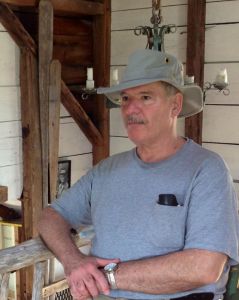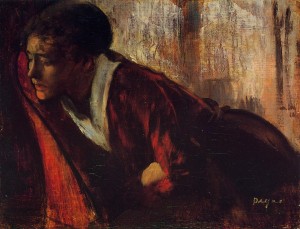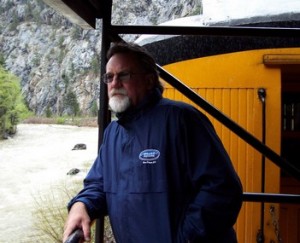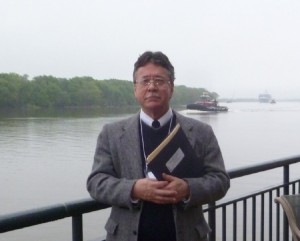Bored, with the boredom of eternity,
Donatien Alphonse François, Marquis de Sade,
and Leopold Ritter von Sacher-Masoch
hang out. They have little in common –
nothing, according to Deleuze –
but shared experience of psych wards
creates a bond. And Sade
is always tickled by the moralism
of his scholarly socialist philosemitic pal.
(“Contracts” for bondage-and-discipline sessions,
the invention of the “safe word”–
parbleu!) Masoch for his part
finds the Frenchman’s wit
instructive, and accepts with grace
his constant teasing; it fulfills a certain need.
Like other dead white Europeans,
they float over to America
(which, they have heard, is diverting and unserious).
Sade preens: “My principles have triumphed!
What other people is as devoted to freedom?”
His companion demurs. “It may seem so,
but note: the whip is unpopular,
hypocrisy remains the spice of shame,
tortures are generally banal, and women –
still bound to the paternalism you despised –
are seldom given equal rights to them.
This is far,” he adds, “from the vision
of your revolutionary pamphlet, Citizens!
Yet One More Effort If You Would Be Truly Republican!”
The mood of the mercurial marquis
turns. “They’re afraid of their masters,”
he sighs. “Whose existence” –
thus Masoch, disapprovingly – “they deny.”
They are not watching in real time,
ever-tedious, but from the long end of a spectrum
where essences appear like subtitles.
There the prevailing mood is an orange haze;
and the steady pop of small arms
a rhythmic growl, like the machinery
the two friends had expected.
Slowly they realize it is a machine,
dispensing souls to each side of the trigger
before they need determine their own nature.

Author of two book-length narrative poems, THE ADVENTURE and HAPPINESS, both published by Story Line Press. A collection of shorter poems, A POVERTY OF WORDS, forthcoming in 2015 from Prolific Press. Has appeared in Hudson Review, Salmagundi, Poetry Salzburg Review, Die Gazette (Munich), The Fish Anthology (Ireland), Representations, Magma (UK), Iota (UK), Bateau, Fulcrum, etc. Online, poems have appeared in Big Bridge, Hamilton Stone Review, Diagram, BlazeVox, The New Hampshire Review, Mudlark, Occupoetry, Faircloth Review, Triggerfish, etc. Adjunct professor creative writing George Washington University.
robin@artvilla.com
PoetryLifeTimes
Poetry Life & Times
editor@artvilla.com
www.artvilla.com
Artvilla.com
poet
Loneliness. A Poem by Rajandeep Garg
A fistful of sunshine
loiters over my window
flickering raw images on my blinds.
Slithers inside gay and gaudy
along the flannel hems of blinds
and beckons the Sun inside, incensed already.
With envy ignited soul, it
sulks over my floor
falling down alongside infinite flares slowly.
Then crawls towards a lonely nook
before brooding up the paneled wall
till our acquaintance mellows a scarlet twilight.
In my sea of loneliness, we three
With oaks of Sunshine, I, sail the Sun
Seeking a shore.
Where the Sun starts to sink, evanescence
followed by Sunshine o’er the offing
drowning me till dawn.

Rajandeep Garg is a young Civil Engineer of 26,from Thapar University and is now more of a poet. He is a member of United Haiku and Tanka Society. His Tanka poems have been appreciated at few international journals. His poetry had appeared in an Indian e-journal The Literary Yard. He spends his nights writing poetry and exploring the night sky.
editor@artvilla.com
robin@artvilla.com
www.facebook.com/PoetryLifeTimes
www.facebook.com/Artvilla.com
Miner’s Quest (To Don Petersen). A Poem by Gary Beck
And the miners came down from the hills
only once a month, to eat, drink, fight,
if they were lucky,
spend the night with a woman,
instead of in jail.
For sheriff Bennett met them at the edge of town
and gave them the same warning each time:
‘Have a good time, boys, but don’t wreck the town.’
And the miners nodded sincerely,
chorused, ‘Sure, sheriff. You bet. We promise.’
But the sheriff was used to their rough ways
and knew they were there to escape the pressures
that gripped them in the bowels of the earth.
And they weren’t bad men, just childlike,
toiling like slaves of eld, then seeking release.
They meant their promises and meant no harm.
Nevertheless, the sheriff hired extra deputies
on the day the miners came to town
for their monthly binge.
Now the miners respected the sheriff,
who understood their need to blow off steam,
but the deputies were another kind of cop.
Mostly young, scared, acting tough to impress the hard men
who only feared Mother Earth’s crushing embrace
waiting to hold them close, far beneath the surface.
And they mocked the posing deputies
who wore one-way sun glasses to hide the uncertainty
that made the miners mistrust them.
There was one deputy the miners really hated.
Reardon, a big-bellied bully, meaner than the rattlesnakes
that sometimes tumbled down the mineshaft
and couldn’t find their way to the surface again
and shared the dark confines with their fellow prisoners
and sometimes got lucky and bit someone,
before the miners could stomp them to death.
The only thing the miners hated more than rattlers
were the bosses, whose venom flowed from far away.
Reardon always greeted them the same way,
slapping his club in his bulbous paw, scaring no one,
but alert for the chance to hurt the miners.
They despised him, staring through him,
another dangerous clod of earth to be avoided ,
but never feared, because he only trapped the unwary,
and if you labored deep below the ravaged earth
you learned to be wary, or didn’t survive
the hungry pits that always beckoned.
So the miners rushed to their favorite bars,
where bored trailer girls served the drinks
and didn’t really care that a lot of hands
did a lot of exploring of their veined bodies.
And they listened to the usual comments:
“That’s a number one shaft. Deep hole. Dig that strata.”
And the girls snapped their gum in boredom,
for they took worse abuse than words
from the harsh hands of their redneck boyfriends.
The retired professor of something or other
met them at ‘Purple Nell’s’ and bought them drinks,
preached to them that they should spare the earth.
They laughed kindly at him and explained it was their job,
if they didn’t do it, the company would hire others
eager to take their place in the mines, because
someone was always waiting to steal a man’s job.
But they never insulted the professor
while drinking his liquor.
The miners never went to ivy covered schools,
had no book learning, just blue collar skill,
acquired the hard way, in the pits of shattered dreams,
where the mines sapped the souls of men
who never got used to the pressing rock above
and the dank, devouring dark below,
always waiting, implacable as time,
to catch a careless miner in a moment’s lapse,
the last summons to the final ascent.

Gary Beck has spent most of his adult life as a theater director, and as an art dealer when he couldn’t make a living in theater. He has 11 published chapbooks. His poetry collections include: Days of Destruction (Skive Press), Expectations (Rogue Scholars Press). Dawn in Cities, Assault on Nature, Songs of a Clerk, Civilized Ways (Winter Goose Publishing). Perceptions, Displays, Fault Lines and Tremors will be published by Winter Goose Publishing. Conditioned Response will be published by Nazar Look. His novels include: Extreme Change (Cogwheel Press) Acts of Defiance (Artema Press). Flawed Connections (Black Rose Writing). His short story collection, A Glimpse of Youth (Sweatshoppe Publications). His original plays and translations of Moliere, Aristophanes and Sophocles have been produced Off Broadway. His poetry, fiction and essays have appeared in hundreds of literary magazines. He currently lives in New York City. A Miner’s Quest appears in Civillised Ways. Editor’s Note.
editor@artvilla.com
robin@artvilla.com
www.facebook.com/PoetryLifeTimes
www.facebook.com/Artvilla.com
Pen Pal. A Poem by Holly Day
My friend has been divided into perforated sheets of new stories
I tell her how I’m pretty here despite having being quartered myself
about the monsters that are loose in my bedroom again
the obscenities that come to the table at lunch.
“I guess I liked to be scared. There’s no other reason for my brutal sophistry
and tearing my hair out in mock terror is fun
and ripping my brain into confetti is fun
I enjoyed nightmares when I was a child, and this where I belong.”
Huge fish with sharp teeth complain about their weight
tell stories and poems that have been gnawed in half.
My last nightmare was almost as thin as I used to be.
I tell her how I’m pretty here when she sends me pictures of her:
Posing on the beach with nubile Afrikaners.
Washing oil off of penguins and seals.
In bed with her new cat.

There’s nothing quite as wonderful as seeing the end of a long winter in Minnesota . The birdfeeder is busy with sparrows and warblers, robins are nesting in the back yard trees, and tulips and daffodils have pushed themselves up all the way up through the moldering piles of last-year’s leaves to explode in a frenzy of yellow, purple, and every shade of pink and red. It’s just warm enough that I can walk my dog in the morning without a jacket, but still cool enough that it’s not complete torture to work in my tiny, windowless office in the basement.
Short bio: Holly Day has taught writing classes at the Loft Literary Center in Minneapolis , Minnesota , since 2000. Her poetry has recently appeared in Oyez Review, SLAB, and Gargoyle, while her recently published books include Music Theory for Dummies (3rd edition), Piano All-in-One for Dummies, The Book Of, and Nordeast Minneapolis: A History.
editor@artvilla.com
robin@artvilla.com
www.facebook.com/PoetryLifeTimes
www.facebook.com/Artvilla.com
Never The Less. A Poem by Trevor Maynard
Before her there is a stone circle
The meaning of which is unclear
But it has been here for thousands of millennia
It is not well known, even unknown
But when the sun rises, the shadows cast
Surround her as she sleeps; gentle wraiths
Whispering in the low cloud, like distant thunder
But this is always as afternoon opens its door
Now, as dawn hazes into morning and midday
She rises to a clear sky, and the shadows are short
The deer have eaten and the birds have flown
But she does not render movement from her pose
But she does drink in the whirling breeze
Delving into buttercup, white daisy and wild geranium
She does embrace another chance to live
But she is not breathing, she has no blood
Tears do not well up in her eyes of their own accord
For that the heavens must open in abundant rain
But not tonight; the sky is heavy with condensation
The air itself wicks the salty emotion of betrayal
The statue of Gaia is taken down; she will miss the stones
Before her there is a soft, old cloth; she cannot see
But she detects the odour of musk and storage
She hears the crack of wood as her crate is moved
Before Man, there is a stone circle, though not only of stone
But of concrete, plastic, glass, aluminium and steel
It has been here for decades, if not a hundred years
Some men rise to the Owl and fall to the Lark
The meaning of day and night is gone for them
But they still seek supper and sleep, even as the sun warms
It is not well known, even unknown
But when the day dawns, and the people commute
They are surrounded in shadow; gentle wraiths
Waiting to caress their eyelids back to slumber
But Man is agitated, he is constant in his fight
He cannot stand still, there is no room for pause
But when will he breath, is there blood pumping to his heart
Are their tears in his eyes before the rains fall
Does he remember the statue of Gaia, he once carved
Before us there is a veil of ignorance, of intolerance
Of disrespect, of discrimination, even betrayal of Nature
But is there no hope, no remembrance, no emotion
Working days end, weekends arrive, Gaia beckons
But only for those who raise their downcast eyes
Who open the wooden crate and unfurl the old, soft cloth
Before her the stone circle is set out once more
Man lays upon Mother Earth as the shadows rise
Late into a summer evening, they are reunited, no buts
Never the less, it is not well known, even unknown
That when the sun rises and gentle wraiths surround us
Each shadow of each stone is Gaia to every Man
Before me there is a stone circle
The meaning of which is clear
Though my single life may pass, I will always be here
©Trevor Maynard 2015. excerpt from and will be included in my third, as yet unnamed collection, which is due out in late Summer www.trevormaynard.com

Author of two poetry collections “Keep on Keepin’ On” and “Love, Death and the War on Terror”, a collection of one-act plays “Four Truths” as well as the plays “GLASS” and “From Pillow to Post”.
THE POETIC BOND V. Publication date 30th September, 2015
The Poetic Bond V is the fifth anthology of poets from new media, social and professional networking, mainly garnered from the professional networking website, LinkedIn, but also through performance and word of mouth. The Poetic Bond is about exploring, sharing and encouraging poetry from all over the world, it will be published by Willowdown Books and will be available on Amazon from 30th September 2015. Copies can be pre-ordered for the pre-publication offer price from http://www.thepoeticbond.com Trevor Maynard is a UK based poet and writer, manager of Poetry, Review and Discuss Group at LinkedIn
editor@artvilla.com
robin@artvilla.com
www.facebook.com/PoetryLifeTimes
www.facebook.com/Artvilla.com
Withdrawn. An Ekphrastic Poem by Richard Lloyd Cederberg
Ekphrastic – composed with triolets
“It is good for a man that he bear the yoke in his youth”

I’m not the one I used to be
Who broke the rules and pushed the bar
Who never wavered, can’t you see
I’m not the one I used to be
But now since much has changed in me
I’ll dream but never go too far
I’m not the one I used to be
Who broke the rules and pushed the bar
I’m not someone of naïve quest
Espousing all that’s given me
Nurturing all my hearts unrest
I’m not someone of naïve quest
But if I’ve not somehow possessed
The art of sweet simplicity
I’m not someone of naïve quest
Espousing all that’s given me
I’m not the one I used to see
In stirring flames and mountain streams
Artless on a raging sea
I’m not the one I used to see
But if I’ve struggled just to be
A somber shawl of unsung dreams
I’m not the one I used to see
In stirring flames and mountain streams
I’ve become withdrawn with age
Beguiled with simple fare
Inspired more to disengage
I’ve become withdrawn with age
Nevermore to war and rage
Against this life unfair
I’ve become withdrawn with age
Beguiled with simple fare
richard lloyd cederberg 2015

August 2007 Richard was nominated for a 2008 PUSHCART PRIZE. Richard was awarded 2007 BEST NEW FICTION at CST for his first three novels and also 2006 WRITER OF THE YEAR @thewritingforum.net … Richard has been a featured Poet on Poetry Life and Times Aug/Sept 2008, Jan 2013, Aug 2013, and Oct 2013 and has been published in varied anthologies, compendiums, and e-zines. Richard’s literary work is currently in over 35,000 data bases and outlets. Richard’s novels include: A Monumental Journey… In Search of the First Tribe… The Underground River… Beyond Understanding. A new novel, Between the Cracks, was completed March 2014 and will be available summer 2014.
Richard has been privileged to travel extensively throughout the USA, the provinces of British Columbia, Manitoba, Alberta, and Saskatchewan in Canada, the Yukon Territories, Kodiak Island, Ketchikan, Juneau, Skagway, Sitka, Petersburg, Glacier Bay, in Alaska, the Azorean Archipelagoes, and throughout Germany, Switzerland, Spain, and Holland… Richard and his wife, Michele, have been avid adventurers and, when time permits, still enjoy exploring the Laguna Mountains, the Cuyamaca Mountains, the High Deserts in Southern California, the Eastern Sierra’s, the Dixie National Forest, the Northern California and Southern Oregon coastlines, and the “Four Corners” region of the United States.
Richard designed, constructed, and operated a MIDI Digital Recording Studio – TAYLOR and GRACE – from 1995 – 2002. For seven years he diligently fulfilled his own musical visions and those of others. Richard personally composed, and multi-track recorded, over 500 compositions during this time and has two completed CD’s to his personal credit: WHAT LOVE HAS DONE and THE PATH. Both albums were mixed and mastered by Steve Wetherbee, founder of Golden Track Studios in San Diego, California.
Richard retired from music after performing professionally for fifteen years and seven years of recording studio explorations. He works, now, at one of San Diego’s premier historical sites, as a Superintendent. Richard is also a carpenter and a collector of classic books, and books long out of print.
www.facebook.com/PoetryLifeTimes
www.facebook.com/Artvilla.com
Poetry Life & Times Interview with Poet R.W.Haynes

R.W. Haynes teaches at a university and writes about literature for academic publications. His doctorate at the University of Georgia (1991) was on sixteenth-century classicism in England. He has taught at Texas A&M International University in Laredo since 1992.
His teaching focuses on literature ranging from the Greeks to the English Renaissance, most of it dealing with medieval material and Shakespeare. Two more recent dramatists, Henrik Ibsen and Horton Foote, have been the focus of his attention in recent years. His book The Major Plays of Horton Foote (Mellen 2010) will be followed next year by an anthology of criticism on the same author.
Here at PLT we have had the privilege of featuring several of his poetic works both in classical & free style form. Intrigued by his background as well as his work in the field of poetry, we have included him in our list of special interviews at PLT, where I would like to begin by putting these questions. Hello RW welcome to our PLT interview. A few questions via Robin Ouzman Hislop Editor
PLT- Which was your first contact with poetry?
RW- Both of my parents were teachers, and both loved literature. My mother wrote poetry and encouraged her children to do the same. I had the honor of reading one of my mother’s poems at my sister’s funeral not long ago.
PLT- Which style in writing defines you?
RW- I’m not sure. It might be easier for someone else to answer that. There are some poetic projects I’d like to try which may be very different from what I’ve written so far. And does one write to be defined? Perhaps one writes to elude definition, at least at times. Remember what Hamlet says to Guildenstern, “Call me what instrument you will, though you can fret me, you cannot play upon me.” Not that I have any earth-shaking mystery in my poetic activity that it would be death to reveal. I do tend to work in more or less formal verse, which some editors and readers find insufficiently edgy or something. Different strokes. And not many of my poems have been long poems, possibly because of feebleness of mind. And sometimes the verse may be a bit angry, even though most of my sonnets are jokes to some extent. Well, anger demands expression, and, when it energizes a composition, that process governs the anger, I think, and wrath becomes something else, as it usually ought to do. To conclude the answer, I do what my Muse tells me to do, hoping all the while that writing about Downtown Waco or The Three Little Pigs or the Texas Campus-Carry legislation or the ghosts of people who aren’t dead yet isn’t some mad aberration arising from academic trauma or lack of tobacco or something.
PLT- Where is the germ of your creation? What triggers the poem?
RW- I join lots of poets in saying that the impulse to write is a constant presence. Perhaps it derives from a sense that language has a kind of magical potential to convey more in special moments than in ordinary ones. It isn’t always enough to yell “Caramba!” or to gasp “The rest is silence.” But let’s look at Shakespeare, whose sonnets show us something about how poetry does what it does. Can’t we say that in those poems there are motives we recognize with a distinct immediacy? Love, bitter disappointment, jealousy, humor, anxiety—all of which in their intensity are subjected to a presence of mind (if I may develop the usual sense of that phrase) and put before us as a kind of imaginative victory, if that is not too strong a word. So it seems to me that often the provocation to verse is a challenge to respond artistically to a moment deserving a poetic response. When the angel gives a command to Caedmon, he understands it is time for him to sing, despite his froglike voice.
PLT- Who were your educative poets?
RW- My mother, of course—Sarah Westbrook Haynes. My father also loved poetry. My older brother was, it seemed and still seems to me, a pretty good poet. Dylan Thomas, Pound, Eliot, Yeats. I majored in Classical Greek as an undergraduate largely because of Pound’s enthusiasm for Homer, but I also always read in the English poets, Chaucer, Spenser, Sidney, Donne. I liked the Romantics except for Wordsworth, whom I learned to respect at about the same time as I found I could read Wallace Stevens at last. I liked the work of a couple of poets, Marion Montgomery and Judith Ortiz Cofer, who were at the University of Georgia when I was there. Shakespeare finally became my job, and his work still amazes, and now as I write drama his skill seems even more unparalleled.
PLT- Do you handle an idea or an aesthetic intention when writing?
RW- I’m sure I try at times. Sometimes the ideas handle me. I won’t say the road to Hell is paved with aesthetic intentions, but I do think we need to reserve some modest disdain for glib or facile effusions that have nothing behind them but a kind of opportunistic exhibitionism. I like all kinds of poetry and poets, but not all poetry is equal in value. Do you remember Cinna the Poet in Julius Caesar? The crowd, infuriated by Caesar’s murder, seized him because one of the assassins was named Cinna. When he protested that he was a poet, the crowd tore him to pieces because of his bad verses. Perhaps the poet, like the blues musician, has to pay dues in one way or another before arriving at competence. On the other hand, youth, though sometimes blind or inconsiderate, can energize expression so much that impulse redeems immaturity and the claims of common sense appear pedantic. One doesn’t want to hear “I fall on the thorns of life!” every ten minutes, but Shelley’s “Ode to the West Wind” still opens a universe of poetic power.
PLT- What do you think of alternative resources for spreading poetical works?
RW- I’m for poetry, however access to it may be provided. Thank God for the Internet, which has done much to diminish the influence of certain kinds of editorial tyranny. I taught two classes today to begin the summer session, and in both I advised the students to write poetry, and I believe some of them took me seriously.
PLT- Do you think that poets, as such, have a special social commitment or that their sensitivity is more exposed to society´s predicaments?
RW- Life usually requires some toughness, no? I visited Poe’s grave in Baltimore a year or so ago, and, of course, it’s painful to reflect on gifted individuals whose artistic souls drive them through destructive experiences and social rejection. One thinks particularly of musicians, though the names of Hart Crane and John Berryman come to mind as well. It is good when such individuals find support and encouragement and can sustain life’s disappointments. Charles Baudelaire said that his humiliations were of the grace of God, and no doubt he derived comfort from that thought. As for social commitment, I’d like to think that a commitment to the pursuit of wisdom would suit poets very well. If we look at the political alignments of poets in the United States, I am sure that far more are Democrats than Republicans, but a review of history might indicate that such characters as the Beowulf poet, Chaucer, Spenser, and Shakespeare aligned themselves with political power to some extent, and no doubt the same was true of Homer. It was in fact reported that it was Caesar Augustus who prevented the posthumous burning of Vergil’s Aeneid. Now that was a patron of the arts. Despite these observations, however, it is also true that heartless greed and meretricious machination do not tend to promote poetic values. Though Lord Byron facetiously claimed to have discovered a new vice in avarice, his sponsorship of Hellenic freedom showed his true feelings. In so far as poets subscribe to humane values, to compassion and respect for their fellow humans, a social sympathy can be expected from them, but, surely, there is a considerable variety in human perspective. Would one expect an insurance executive such as Wallace Stevens to be a great poet?
PLT- Which was the last poetry book you read?
RW- I tend not to read books of poetry by individuals very often. I’m not sure why. It may be that I think I get more from works considered individually or in small groups than in a dense assemblage of poems. So the last book of poetry I read was probably Shakespeare’s Sonnets.
PLT- According to your criterion, what living poet should be re-read nowadays?
RW- Judith Ortiz Cofer, who is a native of Puerto Rico, but who has lived for many years in Georgia. Her work returns the reader to the personal by celebrating personal connections, the kind of sometimes casual devotion that shapes family and the caring individual. Those in search of new variations of insanity have many options, but Cofer’s poetry effectively engages a rare quest for an emotional responsibility which arises from a kind of harmony of verse and perspective.
PLT- Thanks RW for your amazing responses, I hope our readership following will be as profoundly impressed as I am. Also, I must admit, I’m a great fan of Wallace Stevens, him & Samuel Beckett in fact. And thank you again for your recommendation of Judith Ortiz Cofer, I’m intrigued, does she write in her original language, presumably Spanish? Could we entreat of you a sample of one of her works perhaps, and what that means to you and the title of any recommended publication.
RW- Judith Ortiz Cofer writes in English. A collection of her poetry is the volume Reaching for the Mainland & Selected New Poems, Bilingual Press 1995. Her poem “Esperanza,” which can be found at http://www.poetryfoundation.org/poem/240624 demonstrates her sense of the emotional implications of self-centered decisions. The young woman whose name means “Hope” is sketched in a few devastated lines as a person whose hope was cursed at her birth.
PLT- It wouldn’t be fair to wrap this Interview up without some further reference to your works other than those hitherto published here at PLT. So would you be so kind to leave us with one or more, perhaps a favourite of yours, if such a thing is possible.

The Peacock Lady’s Declaration
The lady with glasses put her crutch aside
And said, “I get so sick of parasites
Who think that what a real writer writes
Just kind of bubbles up neatly from inside,
As she stares off in space, then grabs a pen
And puts together a story like a box
With little hinges, snaps, and locks,
And then goes back and puts the symbols in.
Of course, parasites are necessary,
And some of them are pleasant enough to be
Good company, at times, but mortality
Shouldn’t be orderly, at least not very;
Writing here, with these crumbling bones,
Makes new life sprout between inanimate stones.”
The Tomb of Edgar Poe (2014)
Looking for the conference hotel,
I drove by Poe’s grave. Tap tap…
One should definitely shudder a little
At a contact so nearly missed.
Later I walked back, passing by
The Everyman Theater, colder
Than I’m used to being, tap tap,
Down home on the Rio Grande,
-
And on his stone a twisted wreath
Of pasts and half-recalled regrets,
A ribbon, a spoon, a ball-point pen,
Declare our junkie solidarity again.
-
Why wasn’t some demented witch
Out front pouring green lemonade?
A lean, blue owl on her shoulder perched,
Staring as though I, too, were cursed.
Tapped out, forget that dark flower,
Return to harbor past the Bromo-Selzer Tower.
R.W. Haynes
robin@artvilla.com
PoetryLifeTimes
Poetry Life & Times
editor@artvilla.com
www.artvilla.com
Artvilla.com
The Swarm. A Poem by R.W. Haynes
Old words keep some kinds of resonance
When breathed, yet on the page they show
A coolness and an insincerity
Which dry up drama, let the steam escape
From warm expression, draw the judging eye
Of the critic or call for disdain.
So this is a spell for mandolin and harp,
For just-contained jealousy and spite,
For confidences and for bloody threats
Whispered outside taverns in starlight.
If you step up and turn your head a bit
To hear, your eyes alight to learn my news
Of dangers and delights and hidden traps,
I will assure you, though my words be old,
My voice is haunted through and through by songs
Beaten in breasts through torment and hope,
Chorused in kitchen and down country roads,
Alive as your eyes to our destinies,
Resonating like a tense swarm of bees.
R. W. Haynes has taught literature at Texas A&M International University since 1992. His recent interests include the early British sonnet, and he is completing a second book on the Texas playwright and screenwriter Horton Foote (1916-2009). In his poetry, Haynes seeks to celebrate life, liberty, and the pursuit of happiness without sounding any more dissonant notes than he has to. In fiction, he works toward grasping that part of the past which made its mark on his generation. He enjoys teaching drama, especially the Greeks, Ibsen, and Shakespeare, and he devoutly hopes for a stunning literary Renaissance in South Texas.
editor@artvilla.com
robin@artvilla.com
www.facebook.com/PoetryLifeTimes
www.facebook.com/Artvilla.com